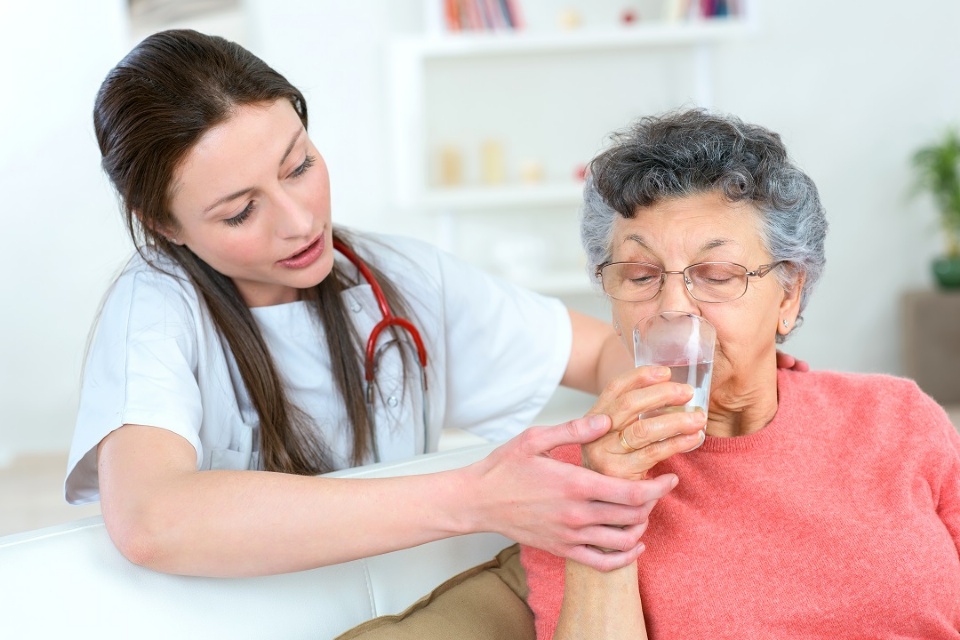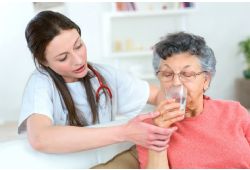The first wave of COVID-19 last spring took seniors’ homes by storm. Since then, measures were taken to lower the number of infections, but also to reduce isolation despite the virus.
A big marker of social isolation in the first wave of the pandemic was that seniors were forbidden to go out or be visited by family. Vanessa Mouliom spent a month and a half without talking to her father due to shortage of staff in her father's residence. Last April, a few iPads were made available on each floor. The staff made appointments for the residents' families so they could talk to their loved ones for 15-20 minutes once every week. Her father was sick with prostate cancer, and when he was on his last legs, the employees called her in an emergency so she could come visit him. She did, and he passed away shortly after.“We all had a bit of a reprieve in May, June, and July. Everybody was happy to have a ‘normal life’ again. Families came back to visit and new employees came in, but we had to keep our guard up,” explains Michel Martel, outreach worker for CIUSS du Centre-Ouest-de-l'Île-de-Montréal. “Some people are not allowed out, and they weren't before COVID either, because they pose a risk to themselves and others, such as those with dementia. During the reprieve, some of the clients were allowed out, and one of them contracted COVID on an outing, suffered from complications, and died.”As cases erupted at his workplace, safety measures, like wearing goggles and gloves, were implemented. According to Martel, things got much better in terms of personal and protective equipment. “Extra employees were added, and that was very helpful,” he says. As of late 2020, the vaccination campaign began at his workplace. “If people are careful and get their vaccines, we will be able to get back to normal quickly, which is why I want to get vaccinated as soon as possible.”To counter isolation, some families also hire help, like Laurie Jutras-Martel, a paid companion for an elderly lady. She goes to the private senior residence CHSLD St-Georges in Montreal five nights a week to ensure that the woman she works for is taken care of.Her client suffers from Alzheimer’s and can wander around, so Jutras-Martel was hired to keep an eye on her and offer her company. “The more she loses her cognitive skills, the more my role is about personal assistance. I provide personal hygiene and help with tasks such as going to bed, but I am also a familial face she sees every day. It's a sense of security for the family to know that there is someone to watch over her,” she says. She was hired because her client's daughters are busy with work and obligations and can't visit their mother often, especially since one of them is an epidemiologist and is overrun with COVID-19 cases at the hospital were she works.During the holidays last December, Jutras-Martel saw a few initiatives to oppose isolation. Some senior homes, including the one she works at, have postal boxes, where loved ones and children can deposit holiday cards.At the time of writing this report, visits were allowed in senior homes in Quebec. During the holiday period, the CHSLD where Jutras-Martel works allowed families to bring homemade food and gifts to residents, bringing much-needed comfort. These kinds of initiatives are essential to lift residents' spirits. “Now, we are starting to see a lot of COVID fatigue, especially for seniors, because they are stuck there,” says Martel. Hopefully, 2021 will be the year where COVID-19 retires from retirement housing. At the time of publication, visits were allowed in senior homes in Quebec. For the holiday period, the CHSLD were Jutras-Martel works at allowed families to bring homemade food and gifts to residents, bringing much-needed comfort. These kind of initiatives are essential to lift residents' spirit. ''Now, we are starting to see a lot of COVID fatigue, especially for seniors, because they are stuck there,'' says Martel. Hopefully, 2021 will be the year were COVID-19 retires from retirement housing.
 In The Latest Issue:Latest Issue:
In The Latest Issue:Latest Issue:
- A Bittersweet Farewell
- The new Laval Aquatic Co...
- The End of an Era:
Articles
Calendar
Virtual- ANNUAL TEACHER APPRECIATION CONTEST
- APPUI LAVAL
- ARTS & CULTURE
- CAMPS
- CAR GUIDE
- CCIL
- CENTENNIAL ACADEMY
- CHARITY FUNDRAISING
- CITYTV
- COSMODÔME
- COMMUNITY CONNECTIONS
- COVER STORY
- DINA DIMITRATOS
- ÉCOLE SUPÉRIEURE DE BALLET DU QUÉBEC
- EDITORIALS
- ÉDUCALOI
- EDUCATION
- EMPLOYMENT & ENTREPRENEURSHIP
- FÊTE DE LA FAMILLE
- FÊTE DU QUARTIER SAINT-BRUNO
- FAMILIES
- FESTIVAL LAVAL LAUGHS
- FÊTE DE QUARTIER VAL-DES-BRISES
- FINANCES
- GLI CUMBARE
- GROUPE RENO-EXPERT
- HEALTH & WELL-BEING
- 30 MINUTE HIT
- ANXIETY
- CHILDREN`S HEALTH & WELLNESS
- CLOSE AID
- DENTAL WELLNESS
- EXTREME EVOLUTION SPORTS CENTRE
- FONDATION CITÉ DE LA SANTÉ
- GENERAL
- HEARING HEALTH
- MESSAGES FROM THE HEALTH AGENCY OF CANADA
- MENTAL HEALTH
- SEXUALITY
- SOCIAL INTEGRATION
- SPECIAL NEEDS
- TEENS
- THE NUTRITION CORNER
- THE NUTRITION CORNER - RECIPES
- VACATION DESTINATION
- WOMEN'S FITNESS
- WOMEN'S HEALTH
- HILTON MONTREAL/LAVAL
- HOME & GARDEN
- INTERNATIONAL WOMEN'S DAY
- JAGUAR LAVAL
- LAVAL À VÉLO
- LAVAL FAMILIES TV SHOW
- LAVAL FAMILIES MAGAZINE CARES
- LAVAL URBAN IN NATURE
- LE PARCOURS DES HÉROS
- LES PETITS GOURMETS DANS MA COUR
- LEON'S FURNITURE
- LEONARDO DA VINCI CENTRE
- LFM PREMIERES
- LIFE BALANCE
- M.P. PROFILE
- MISS EDGAR'S AND MISS CRAMP'S SCHOOL
- MISSING CHILDREN'S NETWORK
- NETFOLIE
- NORTH STAR ACADEMY LAVAL
- OUTFRONT MEDIA
- PASSION SOCCER
- PARC DE LA RIVIÈRE-DES-MILLE-ÎLES
- PÂTISSERIE ST-MARTIN
- PIZZERIA LÌOLÀ
- PLACE BELL
- PORTRAITS OF YOUR MNA'S
- ROCKET DE LAVAL
- SACRED HEART SCHOOL
- SCOTIA BANK
- SHERATON LAVAL HOTEL
- SOCIÉTÉ ALZHEIMER LAVAL
- STATION 55
- STL
- SUBARU DE LAVAL
- TECHNOLOGY
- TEDXLAVAL
- TODAY`S LAURENTIANS AND LANAUDIÈRE
- TODAY`S LAVAL
- WARNER MUSIC
- THIS ISSUE
- MOST RECENT
Magazine
Articles ~e 105,7 Rythme FM 4 chemins Annual Teacher Appreciation Contest Appui Laval Arts & Culture Ballet Eddy Toussaint Camps THIS ISSUE MORE...
CONTESTS Enter our contests
CONTESTS Enter our contests
CALENDAR
Events & Activities
COMMUNITY Posts Events
PUBLICATIONS Our Magazine Family Resource Directory
LFM BUSINESS NETWORK Learn more
COUPONS Click to save!
COMMUNITY Posts Events
PUBLICATIONS Our Magazine Family Resource Directory
LFM BUSINESS NETWORK Learn more
COUPONS Click to save!
SUBSCRIPTIONS
Subscribe to the magazine
Un-Subscribe
E-NEWSLETTER Subscribe to our E-newsletter Un-Subscribe
WRITE FOR US Guidelines & Submissions
POLLS Vote today!
E-NEWSLETTER Subscribe to our E-newsletter Un-Subscribe
WRITE FOR US Guidelines & Submissions
POLLS Vote today!
ADVERTISERS
How to & Media guide
Pay your LFM invoice
SUGGESTIONS Reader's Survey Suggest a Listing
LFM About Us Our Mission Giving Back Contact Us
SUGGESTIONS Reader's Survey Suggest a Listing
LFM About Us Our Mission Giving Back Contact Us
 PICK-UP LOCATIONS
Get a copy of LFM!
PICK-UP LOCATIONS
Get a copy of LFM!
TERMS & CONDITIONS Privacy | Terms
ISSN (ONLINE) 2291-1677
ISSN (PRINT) 2291-1677
Website by ZENxDESIGN



 BY:
BY: 
Tweet
Share